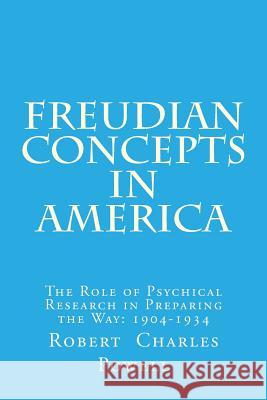Freudian Concepts in America: The Role of Psychical Research in Preparing the Way: 1904-1934 » książka
Freudian Concepts in America: The Role of Psychical Research in Preparing the Way: 1904-1934
ISBN-13: 9781511629805 / Angielski / Miękka / 2015 / 54 str.
"Insofar as Frederic W. H. Myers' conceptions of paranoia ... were spread by the ... 'American Institute for Scientific Research' (1904-1934), they probably did more to help than to hinder American acceptance of psychodynamic psychotherapy. Certainly, the alternative, primarily neuroanatomic, explanations were less elegant, less comprehensive, and not necessarily more scientific." Similarly, "Insofar as ... Myers' conceptions of the 'subliminal' were spread by the ... 'Emmanuel movement' for medically supervised religious psychotherapy (fl.1906-1910), the movement probably did more to help than to hinder American acceptance of Freudian ideas. Certainly, many academic psychologists' conceptions of the 'unconscious' and 'subconscious' were a hindrance." William James (1842-1910) dated the dawn of modern psychology to 1886, the year of the discovery that "there is not only the consciousness of the ordinary field, ... but an addition thereto in the shape of a set of memories, thoughts, and feelings which are extra-marginal." A sizeable historical literature argues about to what author and to what article James referred - and many in the psychical research community appear to have accepted Dr. Powell's well-researched conclusions on this issue. One reviewer called Dr. Powell's work "uniquely interesting" and noted that "Inasmuch as this topic has been neglected in the standard histories of science, Powell's ... research] fills a gap."
Zawartość książki może nie spełniać oczekiwań – reklamacje nie obejmują treści, która mogła nie być redakcyjnie ani merytorycznie opracowana.











